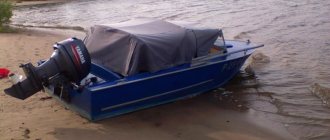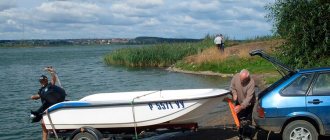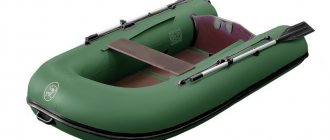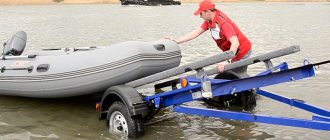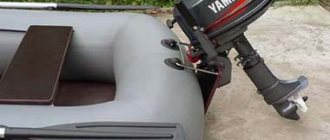Most shipowners believe that there is no need to obtain a license for a boat and register it with the GIMS organization. Certain swimming equipment are not registered, but most often it is impossible to do without it. It is recommended to understand in advance when this procedure needs to be done, what are the specific features of using small vessels (SC). Registering boats is almost no different from registering a car. Here you also need to obtain a number, a certificate and pay tax.
Rules and features of registration of ordinary and inflatable PVC boats
Almost all vehicles must undergo state registration. By law, regular and inflatable boats made of polyvinyl chloride must also be registered.
In order not to be subject to administrative penalties and not to get into a dangerous situation, you need to have certain knowledge that is related to the correct interpretation of the law on floating equipment and its amendments.
Any registration of a watercraft, in this case rubberized boats, is subject to certain rules and steps. What kind of evidence do you need to have with you for the procedure to be successful without further contact with specialists? A person who wants to register to obtain a license must first fall under this category, then he must submit applications using the certificates indicated in the table.
| Documents for submitting an application for vessel registration |
| 1. Passport of a citizen of the Russian Federation |
| 2. Individual registration number awarded by the tax authorities |
| 3. A document that evidences ownership |
| 4. Technical certificates for the boat and motor, which contain information about power and characteristics |
| 5. A receipt notifying that the state fee has been paid |
| Result of application |
| After submitting the specified documents and application, the specialist will issue the owner with side numbers (2 pieces), which must be attached to 2 sides of the vessel. The owner will also receive the results of inspection of the vessel and its maintenance (MOT), which involves 2 phases: performance on water and land. In the first case, the buoyancy function is determined, in the second, the specified parameters and functions. |
Boats made of polyvinyl chloride are subject to state registration on the same basis as for a rubber boat. It turns out that the issuance of certificates for this vehicle depends on how well it complies with the parameters of the technological and physical type.
These requests are relevant only to the inland waters of the Russian Federation. If the owner of a boat wants to enter international waters, regardless of GIMS requests and displacement, he must have a document.
Maintenance costs are paid by the boat owner.
Refusal of registration
Let us clarify once again that this year it is possible to drive a boat without a license. But in the case when its engine is not more powerful than 10.88 liters. s., and the weight is no heavier than 200 kg.
If you are the owner of a small boat, then you must have a license. As well as passing the state registration of the boat. However, this may be denied to you if there are the following grounds:
- There are signs that the markings applied by the builder, the manufacturer of the vessel, have been changed or destroyed.
- The applicant presented documents that, according to GIMS, were lost or stolen.
- The applicant did not appear for the prepared papers and did not make the necessary changes within 30 working days from the date of filing the application.
Required documents
After registering the MS, the owner receives documents that must be carried with him. To receive them, you need to appear at the State Inspectorate for Information Services (GIMS), providing documents. What you need to prepare for registration:
- passport;
- receipt
- contract of sale
- application for registration
- technical inspection
The application can be filled out through State Services and the fee can be paid there.
Registration certificate
This document is the permission and right of the owner of a motor boat to move on water and water areas in the region of the state (RF). The certificate is valid for different cases:
- issuance to water police authorities;
- violation of navigation rules and other controversial circumstances;
- delivery from boat impound areas;
- deeds of purchase and sale.
Registration certificate registration is carried out at the GIMS organization, after the owner submits all the necessary documents.
It turns out that the ship's ticket is the license to the boat; it indicates the personal side numbers. The document includes information about the owner of the vessel, parameters, information about the technical inspection performed.
The ticket is assigned its own number and degree of accounting. A ticket is issued by the state inspection immediately after registration.
The issue of obtaining a driver's license for a motor boat requires a competent and responsible approach. It is better to use the help of specialists. The GIMS will advise the boat owner on all issues.
Technical examination
Technical inspection (TO) of motor boats is carried out through special bodies of GIMS in 2 stages - on water and on land.
When a technical inspection is carried out:
- During the registration of custom designed boats.
- Regular maintenance during operation.
- Inspection of a small vessel to another region or passage.
- After correcting problems found during a technical inspection or repair, re-equipment, emergency, as well as to determine the quality of the vessel at the request of the applicant.
- Replacing the motor (stationary motor).
Point five is quite creative, ambiguous and cannot always be applied, for example, when the updated engine is the same as the previous one.
Documents for technical inspection at GIMS:
- Owner's statement.
- Certificate.
- Ship's ticket.
- If it is not the owner who provides the vessel for the technical inspection procedure, a power of attorney in the usual form of a letter.
There is no state fee for technical inspection.
The right to drive a small boat
In order to obtain the right to operate a small boat, in accordance with the legislation of the Russian Federation, some standards are specified for persons who are offered this opportunity:
- legal age 18 years;
- availability of the results of courses that include an exam in theory and practice;
- results of examination from a narcologist;
- document about the results from the psychotherapist;
- The certificate that confirms ownership or the deed of sale.
Based on the papers presented above, a document is issued - it confirms the right to own and use water transport. To prevent disputes with water inspection authorities, you need to use the rule - always, when going fishing or relaxing on the water, take a certificate that confirms your identity and right to operate a boat, and store it in a container or package protected from liquids.
If legal disputes arise, you need to consult with a specialist (lawyer), by contacting him, thoroughly studying the powers of the two parties on the website of the GIMS company or an organization for the protection of client rights. Document the two people's complaints and make copies of the supporting evidence.
As a result, we can say that small boats that meet all legal standards provide the owner with the opportunity to travel through the waters of Russia without obstacles; you just need to check these places thoroughly so as not to violate the rules of navigation.
Documents for registration
The list of main documents required to register a boat:
- passport of a citizen of the Russian Federation or residence permit (original registration form, which must be completed according to the sample and photocopies);
- certificates that confirm the purchase of the vessel, most often the list includes: check, invoice, contract, etc. (original and photocopies);
- technical certificates for the motorboat and power unit, which confirm that they are made according to the standards.
You also need to have proof of payment of state duty and court issue. ticket
Documents for a motor boat without license or registration
Shipowners of inflatable boats and light boats ask a logical question: what certificates are required to operate a motor boat? There is no precise information in the legislation on this matter. But it is necessary to have an identity document. Some recommend using a purchase and sale agreement or other legal documents confirming ownership.
Which boat doesn't require a license?
According to the requirements of the KTM of Russia and the provisions of the KVVT, it is possible to determine which specific outboard motors do not require licenses and registration. Since 2012, small boats weighing up to 200 kg, equipped with outboard motors up to 8 kW (10 hp) inclusive, do not need to be registered. To determine the mass of a small vessel, it is necessary to take into account the provisions of GOST.
According to this standard, the weight of a loaded motorboat is calculated along with the weight of the heaviest power unit together, recommended by the manufacturer, along with the weight of the mounted stationary fuel system, engine controls and steering system.
What you need to have on the boat in any case
Now it is clear whether a boat license is required and under what conditions. In conclusion, it is proposed to familiarize yourself with what you need to have on board a motorboat in accordance with the new law of the Code of Administrative Offenses of the Russian Federation, Article 11.8:
- The supply criteria are not applicable to watercraft whose weight is up to 200 kg and whose engine power is up to 10.88 hp. At the same time, it is important to have a first aid kit, an anchor and oars on board, but if this “equipment” is not available, GIMS employees will issue a fine.
- Life jackets. If there are none, then the GIMS specialist will not “forgive” this offense, with the exception of the above category of motorboat owners. Everyone else is subject to the law and must also have vests. They are worn by all people on board. Products should have a red or orange tint with reflective components for better visibility. The vest is equipped with an additional tool - a whistle.
Life jackets are important not so much for the GIMS inspector as for the people on board the craft, so it is not recommended to trust cheap products, up to one and a half thousand rubles.
These are safety devices, but not life-saving ones. There is a difference between them. The design of a life jacket is made in such a way that when falling into the water, it turns a person on his back and keeps him afloat, even if he does not have swimming skills or the physical ability to row water. A regular safety vest does not have this capability, so if the passenger or driver cannot swim or is unconscious, then the chances of rescue are reduced. Therefore, it is important to have the first type of vest with you - a life jacket - when in any watercraft.
Boat transport tax
Payers are the persons to whom the watercraft are registered.
According to the new amendments, all boats (oared and without an engine) weighing 200 kg will be subject to TN from January 2021. The tax base of the transport tax (TN) is the engine power, measured in horsepower (hp). The amount is calculated by multiplying the fuel charge rate per 1 hp by the engine power. Since recently, transport tax has been paid by the owner of the vehicle at the rates of the region, region of Russia where the owner was registered.
The tax base for a boat without a motor is 1 vehicle unit. Transport tax rates for boats without power units that remain registered with GIMS, and other vessels without engines, also need to be known in each individual region.
The transport tax on boats has increased significantly in certain regions of the Russian Federation. It turns out that with an increase in administrative responsibility for the use of unregistered vessels, the size of the technical requirements for them will also increase. And now the highest rates are for ships with a power of more than one hundred horsepower. Here the question of the financial feasibility of owning a boat is in great demand - for its powerful power unit you need to pay 2-3 thousand rubles at a minimum.
To pay the TN, the applicant must have the following documents:
- passport;
- statement;
- ship's ticket.
To save time, the owner of the boat needs to submit a similar application using the State Services portal.
Registration of a Boat in GIMS: Rights, Taxes, Fines
- used for movement in areas closed to normal use or near state borders;
- length from 20 meters or more;
- with a permitted number of passengers of 13 or more;
- with a weight heavier than 200 kilograms;
- with a power plant with a declared maximum power of more than 8 kW or 9.9 horsepower;
- with a power unit with a power of up to 10 horsepower, but the installation of engines above 9.9 l/s is permitted.
Tips for fisherman: Spoons for vertical trolling from a boat - Detailed review
The documents are in order, the ID is in your pocket and the ship's ticket has been received. There is one more important step left to confidently and freely disperse the waves on the territory of the Russian Federation - this is to put a number on the boat in accordance with the rules of GOST and GIMS.
After the adoption of new rules, inspection of watercraft is carried out in two stages. The first stage consists of sea trials afloat, after which the vessel undergoes final procedures related to its suitability for further operation. All costs associated with lifting the boat are borne by the owner.
Is it possible to go out on a boat without a license and registration?
If the boat does not meet the registration conditions, then a driver's license is not required. In general, if we are talking about a boat that is not subject to state registration, then there is no need to talk about permission to operate it. This means that the requirements of 11.8.1 do not apply to motor boats that are not subject to registration. It turns out that there is no need to carry documents that confirm ownership, which are not subject to registration.
Some specialists from the GIMS organization claim that you do not need to have photocopies of title certificates with you - this is only a recommendation from the state inspection, while others, more senior specialists, claim exactly the opposite, saying that you need to carry certified photocopies with you.
Sometimes joint inspections of the state inspectorate and the police are carried out. “Outboards” are often stolen - they are low-powered, sometimes with motor boats. Therefore, if the owner has an “unregistered” one, then there is a possibility that the boat or engine is on the list of stolen ones. The shipowner may be stopped to check this point - in this case, evidence must be presented, i.e. documentation.
In addition, legislation regarding MS is currently changing quite quickly. The boat is currently not being registered, but tomorrow it may be mandatory to register.
Fines for violation
A shipowner, operating a small craft that does not have a certificate, a ship's ticket or a photocopy thereof approved in a certain manner, as well as documents confirming the right to own, use, dispose of the boat, in the absence of the owner, will be warned by the State Inspectorate for Inspectorate or a fine of 100 rub.
Thus, the boat must be assigned a license, a ship’s ticket, and if the driver of the boat is not the owner, who is currently prohibited from being observed on board, then a power of attorney for the right to “ownership of the vessel” is also required.
Fishermen in inflatable boats are required to wear life jackets
First of all, the largest category of water recreation enthusiasts - fishermen - will have to worry about their own safety. From now on, they will be required to acquire life jackets. Andrey Pechenin, head of the state inspection department for small vessels of the Ministry of Emergency Situations of Russia, spoke about this at a press conference in Rossiyskaya Gazeta. Previously, fishermen were, in fact, if not completely excluded from legal regulation, but the rules did not apply to them as owners of small vessels. Their boats either had low-power motors or were generally oared, which meant they were not subject to registration. Now you won’t have to register your boats, but you will have to wear life jackets even if you swim a meter from the shore.
In addition, both fishermen and owners of boats and yachts will need to take into account significant changes in navigation rules. It will be impossible to fish or stop under bridges, on the fairway, or near buoys.
And fishermen, by the way, often sin with this, because most of the fish are in the deepest places, that is, next to the fairway or under bridges, from where a variety of food often falls from above.
The restrictions, and very serious ones, will affect owners of pleasure boats and small businessmen who ride beachgoers on bananas, cheesecakes or parachutes. Starting next year, they will have to look for places for their business away from swimmers. And people will also not be allowed to ride near the swimming area of the beaches.
This norm, by the way, will generally apply to all owners of any small vessels. They will not be allowed to approach closer than 50 meters to the restrictive buoys.
But the saddest thing awaits pet lovers. From now on they will have to come to the beach without them. According to Andrei Pechenin, an exception to the new order is made only for guide dogs. But even in this case, in order to avoid conflict situations, dog owners will need to have confirmation that the dog is a guide dog.
Beach photographers with monkeys, raccoons and parrots will also be banned from the beach. According to the new standards, no living creatures will be allowed to enter the beach.
From January 1, fishermen in inflatable boats will have to wear life jackets. It will no longer be possible to fish without them.
The Ministry of Emergency Situations does not rule out that beach owners will allocate special places in front of the swimming area where dogs can be tied up and left, but these measures and control over them already concern the regional authorities.
Owners of small vessels will be prohibited from stopping under bridges, near fairways and buoys. Photo: RIA Novosti
There is some good news. Inspection of small boats, as before, must be carried out once every five years, and in order to change your license, you will need to have only three documents: an expired license, a medical certificate and a receipt for payment of the state duty.
conclusions
The registration procedure is mandatory for boats that meet the main conditions: weight 200 kg, motor 10.88 hp, 8 kW. For a boat operator who is not subject to these requirements, it may be very helpful to carry identification (or a certified copy thereof) to provide confidence and help protect rights when questioned by GIMS officers.
At the legislative level, there is no precisely formulated requirement for the skipper to have documents that can confirm the legality of ownership and disposal of the ship he manages, as well as a certificate certifying his identity. But GIMS (to prevent problems) advises to have documents with you.
Of course, visiting the GIMS to certify photocopies of the DCP (purchase agreement) and other documents requires spending time, it is worth it, although this is a voluntary matter.
Registration
Which outboard motor does not require a license? According to the most current GIMS requirements - with a power of less than 10.88 hp. Let's now see what other requirements for motor boats have changed. Let's start with registration.
Before the introduction of new provisions of the Russian Ministry of Emergency Situations, the owner could register the vessel at his own choice:
- At your place of residence.
- By location where the ship is based.
Today, the procedure for registering a small vessel takes place at the registration address of its owner. You must contact any of the State Historical Inspectorate departments throughout Russia.
Which inflatable boats with a motor do not need to be registered and obtained a license?
For beginner water motorists, I will answer: 99% of inflatable boats are far from reaching a mass of 200 kg. Even such a heavy boat as the Zodiac Cadet RIB 400 weighs 165 kg. And this is 4 meters long and a RIB design. Most of you use ordinary inflatable floats, which, God forbid, weigh 100 kg. For example, the currently popular Frigate boats, model 370 Pro, weigh a little more than 70 kg. Put a Tohatsu 9.8 weighing 26 kg on its engine. and in total you will have 96 kg. Add a battery, an extra seat, an echo sounder and whatnot and you still won’t reach the 200 limit.
Which boats need to be registered?
Registration of a vehicle on water gives the owner of the vessel the absolute right to own and use it for his own purposes on any body of water in our country.
The rules stipulated in the legislation of the Russian Federation oblige boat buyers to register their watercraft with special authorities.
Traveling on an unregistered boat threatens the owner with a financial fine.
Nowadays, the registration of the boat owner is especially monitored if it is used on the river.
Among the boats, including inflatable PVC ones, the following must be registered:
- Boats without a motor with a length of more than twenty meters;
- Boats without a motor weighing more than two hundred kilograms;
- Floating vessels with more than twelve seats;
- Any surface vehicle with a power greater than 8 kW or 10.88 horsepower.
Where there is correct accounting, the vessel will not leak; in what cases is registration of an inflatable boat required?
When fishing, you simply cannot do without a surface vehicle such as an inflatable rubber or PVC boat. Inflatable boats allow fishermen to get to places they need to try to increase their catch.
Each vessel model differs from the other in various parameters: length, carrying capacity, weight, horsepower, power in kilowatts, etc.
Our country has a law on mandatory registration of water vehicles - catamarans, jet skis, yachts, cutters, and various boats.
Do I need to register an inflatable boat without a motor?
According to the order of the Ministry of Emergency Situations of the Russian Federation No. 500 dated May 29, 2005, PVC watercraft without motors weighing up to 225 kilograms do not need to be registered. After amendments made to Federal Law No. 36 on April 23, 2012, it became possible to use inflatable boats without motors weighing up to 200 kg inclusive without registration.
An important nuance is that the rule is valid only in inland waters of the Russian Federation. If you are going to raft in areas closed to public use or along state borders, then regardless of the size, engine availability and carrying capacity of the water transport, it will have to be registered.
Owners of inflatable rowing boats without a motor weighing more than 200 kilograms must collect the necessary documents to submit them to the GIMS of the Ministry of Emergency Situations of the Russian Federation to register the vessel. The procedure must start within 10 days after purchase.
Many models of inflatable boats can be upgraded by installing an outboard motor. If the purchase of a vessel and a motor occurs at the same time, they are registered together. When it comes to equipping an already used PVC watercraft with an engine, it will be necessary to update the registration of the vessel (repeat procedure).
Even small inflatable boats without a motor are personal watercraft. Documents for them are drawn up according to the owners’ passports.
What should be in a boat when on a body of water
Table of supplies for supervised vessels
6.3.4.7. All ships, regardless of class, must be equipped with a rope of appropriate length, caliber and material to ensure the safety of mooring and towing ships in navigation areas, and ships of classes 1-3 must have a lifeline of at least 16 meters in length
6.3.4.8. Vessels with sailing rigs must be equipped with safety belts (devices that replace them) according to the number of crew members involved in servicing the sails.
6.3.4.9. Each ship of classes 1-4 must have a complete first aid kit.
6.3.4.10. Vessels of 1-3 classes must be equipped with an electric lamp suitable for signaling, and vessels of 1 class, in addition, must have a searchlight (search light).
6.3.4.11. All motor and sailing vessels must have a set of tools for repairs, which must include a hacksaw, and sailing vessels, in addition, must have a means for cutting rigging in extreme conditions.
6.3.4.12. Each vessel, except for jet skis, must have a manual dewatering device (bucket, scoop, etc.) and a release hook (oar on rowing boats). Motor vessels and vessels with sailing equipment, where this is provided for by the technical specifications, must have at least 2 oars for use as a backup propulsion device.
6.3.4.13. Vessels of 1-2 classes must have a course indicator (compass), a lot, anemometer, barometer, binoculars and a map of the navigation area, and vessels of 1 class, in addition, must be equipped with radiotelephone communications and radar reflectors.
6.3.4.14. All vessels, regardless of the category of navigation, except for rowing boats of boat (rental) stations and jet skis, must be equipped with red light flares in an amount of at least 3 pieces, and vessels of 1-3 classes must additionally be equipped with red light distress signal flares.
6.3.4.15. Storage conditions must be provided on ships to ensure the safety and readiness for action of the pyrotechnics on board.
6.3.4.16. The basis for assessing the technical condition as “fit” is the presence and serviceability of supplies, their compliance with the above requirements.
6.3.4.17. The basis for assessing the technical condition as “limitedly suitable” is the discrepancy between the nomenclature of supplies and the category of the pool that determines the class of the vessel, while the ship is assigned the class to which the available supplies on the ship correspond.
6.3.4.18. The basis for assessing the technical condition as “prohibited for operation” is the absence of the above-mentioned supplies on the ship or their malfunction.
Supplies missing from the Table of Contents are provided for by the Temporary Rules in blue font.
Boat motor power
The power of boat motors is measured in horsepower. The choice of motor power for your vessel is based on the dimensions of the product. An approximate calculation is made using the formula: power = 1 liter. With. x 30 kg of transported cargo. Main types:
- Low-power motors - from 2 to 10 horsepower. For floating craft up to three meters in length, it is advisable to install motors up to 5 horsepower. If the length of the boat reaches 3.5 meters, then a motor with a power of 6-8 horsepower will suit it.
- Average power - from 10 to 30 horsepower. Such engines are installed when transporting four or more passengers is expected. For a vessel size of 3.5 meters or more, it is recommended to use an engine power of 18 horsepower or more.
- Powerful - over 30 horsepower. Such motors have a wide range of applications: from long walks to transporting passengers.
The power parameter has one of the key values when there is or is no obligation to register a water vehicle and obtain rights to it. The power of a boat motor without a license to operate a boat and its registration upon registration is much less than the power of a boat with a motor, for which ownership and registration are required. There is a golden rule: the less powerful the motor, the higher the chances of bypassing paperwork. Well, if you want it faster, then you need to be prepared to go through the authorities.
